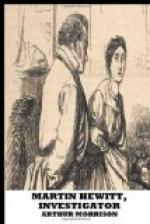“Tortuga.”
“It is. ‘Tortuga,’ however, is only the old Spanish name; the Haytians speak French—Creole French. Here is a French atlas: now see the name of that island.”
“La Tortue!”
“La Tortue it is—the tortoise. Tortuga means the same thing in Spanish. But that island is always spoken of in Hayti as La Tortue. Now, do you see the drift of that paper pinned to Rameau’s breast?”
“Punished by an avenger of—or from—the tortoise or La Tortue—clear enough. It would seem that the dead man had something to do with the massacre there, and somebody from the island is avenging it. The thing’s most extraordinary.”
“And now listen. The name of Domingue’s nephew, who was Chief Minister, was Septimus Rameau.”
“And this was Cesar Rameau—his brother, probably. I see. Well, this is a case.”
“I think the relationship probable. Now you understand why I was inclined to doubt that Goujon was the man you wanted.”
“Of course, of course! And now I suppose I must try to get a nigger—the chap who wrote that paper. I wish he hadn’t been such an ignorant nigger. If he’d only have put the capitals to the words ‘La Tortue,’ I might have thought a little more about them, instead of taking it for granted that they meant that wretched tortoise in the basement of the house. Well, I’ve made a fool of a start, but I’ll be after that nigger now.”
“And I, as I said before,” said Hewitt, “shall be after the person that carried off Rameau’s body. I have had something else to do this afternoon, or I should have begun already.”
“You said you thought he saw the crime. How did you judge that?”
Hewitt smiled. “I think I’ll keep that little secret to myself for the present,” he said. “You shall know soon.”
“Very well,” Nettings replied, with resignation. “I suppose I mustn’t grumble if you don’t tell me everything. I feel too great a fool altogether over this case to see any farther than you show me.” And Inspector Nettings left on his search; while Martin Hewitt, as soon as he was alone, laughed joyously and slapped his thigh.
* * * * *
There was a cab-rank and shelter at the end of the street where Mr. Styles’ building stood, and early that evening a man approached it and hailed the cabmen and the waterman. Any one would have known the new-comer at once for a cabman taking a holiday. The brim of the hat, the bird’s-eye neckerchief, the immense coat-buttons, and, more than all, the rolling walk and the wrinkled trousers, marked him out distinctly.
“Watcheer!” he exclaimed, affably, with the self-possessed nod only possible to cabbies and ‘busmen. “I’m a-lookin’ for a bilker. I’m told one o’ the blokes off this rank carried ’im last Saturday, and I want to know where he went. I ain’t ‘ad a chance o’ gettin’ ’is address yet. Took a cab just as it got dark, I’m told. Tallish chap, muffled up a lot, in a long black overcoat. Any of ye seen ’im?”




